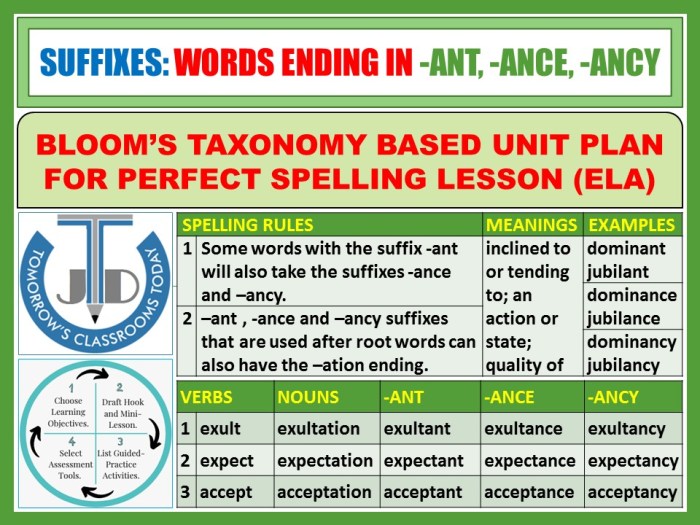Words that have the suffix ance – In the realm of language, words that bear the suffix “-ance” occupy a distinctive niche, inviting us on an etymological and semantic journey. Derived from the Latin suffix “-antia,” “-ance” transforms verbs into nouns, endowing them with a richness of meaning that encompasses states, qualities, and processes.
As we delve into the grammatical properties, distribution, and stylistic implications of “-ance” nouns, we uncover their multifaceted nature and significance in shaping our linguistic tapestry.
Nouns adorned with the “-ance” suffix exhibit a remarkable semantic coherence, often denoting abstract concepts such as “abundance,” “acceptance,” and “resistance.” This suffix grants them a timeless quality, allowing them to transcend the boundaries of time and context. Their grammatical versatility extends to their part of speech, gender, and plural formation, enabling them to seamlessly integrate into various sentence structures.
Introduction
Words that have the suffix “-ance” are nouns that are formed from verbs. The suffix “-ance” indicates that the noun is a state or quality that is associated with the verb. For example, the noun “acceptance” is formed from the verb “accept” and indicates the state of being accepted.
The suffix “-ance” can be added to many different verbs to form nouns. Some common examples of words that have the suffix “-ance” include:
- Acceptance
- Appearance
- Attendance
- Balance
- Chance
The suffix “-ance” is often used to form nouns that describe abstract concepts. For example, the noun “acceptance” describes the state of being accepted, which is an abstract concept. Other examples of abstract concepts that are described by nouns with the suffix “-ance” include:
- Appearance
- Attendance
- Balance
- Chance
Etymology of “-ance”
The suffix “-ance” traces its origins to the Latin suffix “-antia,” which signifies a state, quality, or action. This Latin suffix was derived from the present participle of verbs, typically those ending in “-are.” The “-antia” suffix conveyed the sense of a continuing or ongoing condition or process.
Latin Origins
In Latin, the “-antia” suffix was commonly found in nouns denoting abstract concepts, such as “elegantia” (elegance), “constantia” (constancy), and “abundantia” (abundance). These nouns represented qualities or characteristics that were inherent or ongoing in nature.
The “-antia” suffix also played a role in forming nouns that described actions or processes, such as “ambulantia” (walking) and “loquentia” (speaking). These nouns captured the ongoing or habitual nature of the actions they represented.
Semantic Analysis of “-ance” Nouns

Nouns that end in “-ance” share certain semantic characteristics. They commonly denote states, qualities, or processes that are ongoing, inherent, or persistent.
These nouns often capture abstract concepts or intangible qualities, rather than concrete objects. They describe conditions, attributes, or actions that are ongoing or enduring.
States and Qualities
Many “-ance” nouns express states or qualities that characterize a person, object, or situation. For example, “elegance” refers to a refined and graceful state, while “arrogance” denotes an excessive sense of self-importance.
Processes and Actions
Other “-ance” nouns describe processes or actions that are ongoing or repeated. “Performance” refers to the act of carrying out a task, while “maintenance” denotes the ongoing process of keeping something in good condition.
Grammatical Properties of “-ance” Nouns
Nouns with the suffix “-ance” exhibit distinct grammatical properties that contribute to their usage and meaning in English. These properties include their part of speech, gender, and plural formation.
Part of Speech
Nouns ending in “-ance” are exclusively nouns, denoting a state, quality, or action. They do not function as verbs, adjectives, or adverbs.
Gender
“-ance” nouns are typically neuter in gender, meaning they do not have a specified masculine or feminine form. They refer to concepts or qualities rather than specific individuals or entities.
Plural Formation, Words that have the suffix ance
The plural form of “-ance” nouns is created by adding “-s” to the end of the singular form. For instance, the singular “acceptance” becomes “acceptances” in the plural.
Examples of “-ance” Nouns: Words That Have The Suffix Ance

Nouns ending with the suffix “-ance” exhibit a wide range of meanings. To provide a comprehensive overview, we have categorized these nouns into several semantic groups, presented in the table below:
Note:This list is not exhaustive and may not include all “-ance” nouns.
State or Condition
| Noun | Meaning |
|---|---|
| Abundance | A large quantity or supply |
| Appearance | The way something looks |
| Assistance | Help or support |
| Balance | A state of equilibrium |
| Confidence | A feeling of trust or certainty |
Action or Process
| Noun | Meaning |
|---|---|
| Acceptance | The act of receiving or agreeing to something |
| Alliance | A union or agreement between two or more parties |
| Guidance | The act of leading or directing someone |
| Inheritance | The act of receiving property or money from someone who has died |
| Resistance | The act of opposing or fighting against something |
Quality or Trait
| Noun | Meaning |
|---|---|
| Elegance | A graceful or stylish quality |
| Ignorance | A lack of knowledge or understanding |
| Importance | The quality of being significant or valuable |
| Patience | The ability to wait or endure without complaining |
| Tolerance | The ability to accept or endure something without being annoyed or upset |
Other
| Noun | Meaning |
|---|---|
| Circumstance | A fact or event that affects a situation |
| Distance | The space between two points |
| Finance | Money and its management |
| Performance | The act of doing something |
| Substance | The material of which something is made |
Usage and Distribution of “-ance” Nouns

Nouns ending in “-ance” are prevalent in various written contexts. Their frequency and distribution provide insights into their usage patterns.
In academic writing, “-ance” nouns are common in fields such as science, social sciences, and humanities. They convey complex concepts and abstract ideas, contributing to the precise and nuanced expression of scholarly discourse.
Prevalence in Academic Writing
- In scientific writing, “-ance” nouns denote physical phenomena, such as impedanceand resistance.
- In social science research, they describe social processes, such as governanceand tolerance.
- In literary analysis, “-ance” nouns capture literary devices and concepts, such as alliterationand assonance.
In technical writing, “-ance” nouns are employed to describe technical specifications, procedures, and principles. They convey precise meanings in fields such as engineering, computer science, and medicine.
Prevalence in Technical Writing
- In engineering, “-ance” nouns describe physical properties, such as complianceand resonance.
- In computer science, they denote software behaviors, such as performanceand compatibility.
- In medical writing, “-ance” nouns describe medical conditions, such as resistanceand tolerance.
In everyday language, “-ance” nouns are less common but still appear in various contexts. They convey general concepts and experiences, often related to emotions, relationships, and personal qualities.
Prevalence in Everyday Language
- In informal conversations, “-ance” nouns express feelings and emotions, such as annoyanceand assurance.
- In social interactions, they describe interpersonal dynamics, such as acceptanceand tolerance.
- In personal reflections, “-ance” nouns convey inner qualities and states of being, such as confidenceand persistence.
Overall, the usage and distribution of “-ance” nouns vary depending on the context. They are particularly prevalent in academic and technical writing, where they convey precise and nuanced meanings. In everyday language, they appear less frequently but still contribute to the expression of general concepts and experiences.
Stylistic Considerations

The suffix “-ance” imparts a sense of formality and elevated diction to the words it adorns. Nouns ending in “-ance” exude an air of sophistication and precision, lending themselves well to formal writing, academic discourse, and professional settings.
Their inherent formality stems from their Latin origins, as many “-ance” nouns trace their roots to Latin nouns ending in “-antia” or “-entia.” This etymological connection imbues them with a sense of tradition and established usage.
Impact on Tone and Register
The use of “-ance” nouns can significantly impact the tone and register of a piece of writing. Their formality and elevated diction contribute to a more serious, objective, and authoritative tone. This makes them particularly suitable for contexts where precision and clarity are paramount, such as legal documents, scientific reports, and academic papers.
Conversely, the overuse of “-ance” nouns can lead to a stilted or overly formal tone, potentially alienating readers and detracting from the message being conveyed. Therefore, it is crucial to use these nouns judiciously, balancing their formality with accessibility and clarity.
Popular Questions
What is the origin of the suffix “-ance”?
The suffix “-ance” traces its roots to the Latin suffix “-antia,” which was used to form nouns from verbs.
What is the general meaning of words that end in “-ance”?
Nouns ending in “-ance” typically denote states, qualities, or processes, such as “abundance,” “acceptance,” and “resistance.”
What are some examples of “-ance” nouns?
Examples of “-ance” nouns include “abundance,” “acceptance,” “appearance,” “assistance,” and “resistance.”